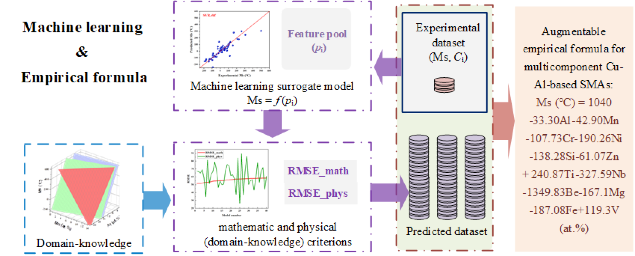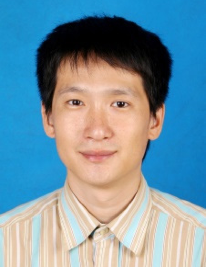Machine learning assisted empirical formula augmentation
Haiyou Huang*, Bin Xiong, Xinpeng Zhao, Yunfeng Hu, Yang Liu, Yanjing Su
Institute for Advanced Materials and Technology, University of Science and Technology Beijing, Beijing 100083, China
EXTENDED ABSTRACT: Tuning the martensite transformation temperature through composition design has become an important way to broaden the applicable temperature range of shape memory alloys (SMAs). When designing the composition of shape memory alloys for application needs, obtaining the relationship between composition and phase transition temperature often relied on empirical formulas fitted based on experimental results. However, due to the limitation of the amount of experimental data, it is difficult for the fitted empirical formula to accurately predict the martensitic transformation at a larger composition space. In present work, we proposed an augmentation strategy of empirical formula based on a machine learning (ML) method to build the relationship between martensite transformation start temperature (Ms) and compositions in Cu-Al-based SMA system. A series of ML models were established by physical and chemical features and a Gaussian radial basis kernel function support vector machine (SVR.rbf) model was screened out based on mathematical and domain knowledge criteria. An augmented empirical formula of Ms as the function of compositions was fitted based on the abundant augmented dataset combined experimental data with predicted data by the SVR.rbf model. Compared with previous empirical formula fitted by small experimental dataset, the accuracy and robustness of the augmented empirical formula was significantly improved without additional experimental cost. This strategy offers a recipe to build empirical formula based on a small experimental dataset.

Figure 1. A schematic of machine learning assisted expansion of empirical formulas

Haiyou Huang has completed his PhD from Department of Material Physics and Chemistry, School of Material Science and Engineering, University of Science and Technology Beijing in 2007, and Postdoctoral studies from the Hong Kong University of Science and Technology in 2009. Now, he is associate professor and master supervisor of University of Science and Technology Beijing. He has published 3 books and more than 60 papers in reputed journals such as npj computational materials, Applied Physics Letters、APL Materials、Scripta Materials, Materials Design, and has applied 13 Chinese invention patents. In 2017, he won the second prize of Natural Science Award of the Ministry of Education. His main research directions include: MGE database and big-data technology; data driven research and development of advanced materials; shape memory alloy, etc.